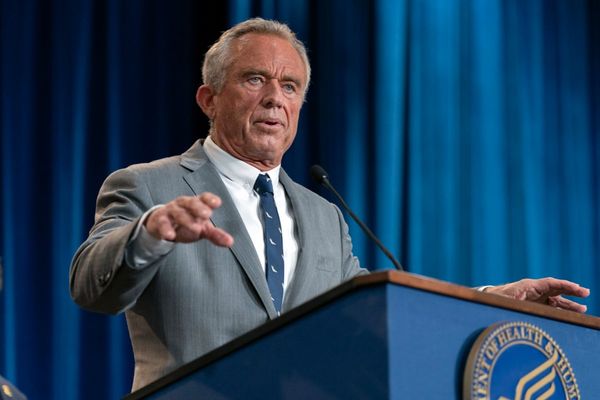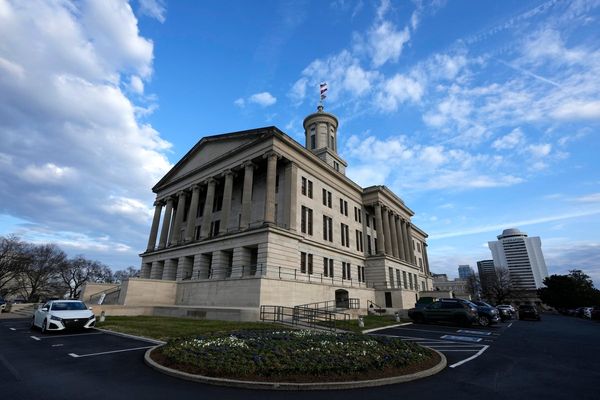Once again, we’ve completed another excruciatingly slow journey from one December to the next, exhausted and unrewarded for our trouble. Let’s take stock of what’s different: The average temperature has risen from Too Damn Hot to Even Damn Hotter. We now have audio proof of our Legislature’s moral bankruptcy. Donald Trump became the third president to be impeached by the U.S. House.
But much has stayed the same too. Agriculture Commissioner Sid Miller is still saying wacky stuff on the Internet. Your in-laws will continue to complain about the quality of your perfectly good Christmas ham—much like the perennially overcompensating state representative Briscoe Cain will mewl about the imminent seizure of his AR-15s.
There was a lot to keep track of this year, and Texas’ underreported regions might have been off your radar. Around this time last year, I penned a listicle highlighting stories about rural Texas you may have missed. Readers flocked to it like so many chickens on a cricket. As my fellow countrykin in rural Texas are inclined to say: If it ain’t broke, don’t fix it. So I won’t. Instead, I’ll give you this gift—a view into the weird, sad, and sometimes funny world of rural Texas. I hope you enjoy it. And until we meet next in December 2020, one year older but none the wiser, happy holidays!
1. “A 1980 murder in an Idaho mining town shuttered its only school. Now the suspect has been found on a Texas ranch.” Meagan Flynn, the Washington Post
The trouble started on an autumn night in 1980, when a jealous lover allegedly barged into a Clayton, Idaho, saloon. Forty-seven-year-old Walter James Mason, a rodeo-scarred bareback rider, accused Daniel Woolley of having an affair with his wife. A fight broke out between the two men, ending when Mason fatally shot Woolley in the head, witnesses said.
And then Mason simply disappeared—until October 2019. Mason had been wanted for murder for nearly 40 years; he had been on the lam so long that even the FBI had given up on finding him. Then a tip came into the Eastland County Sheriff’s Office: It said Mason, now 86, was hiding out in the community of Rising Star, population 830, living under the pseudonym Walter James Allison. When the sheriff came knocking on his door on the outskirts of town, asking if his name was actually Mason, he replied: “If you did not know the answer to the question, you would not even be here.”
2. “Texas signed off on the restoration of this old mine. Now a leaky landfill is contaminating groundwater.” Kiah Collier, Texas Tribune, and Naveena Sadasivam, Grist
Texas is the land of larger-than-life ranches. We’ve got the King Ranch, 825,000 acres of livestock, oil, and fantastic moustaches. Then there’s the Wagonner, a North Texas gem purchased by L.A. Rams owner Stan Kroenke in 2016. There’s the XIT and La Escalera and the O’Connor and the 6666. But one ranch you probably haven’t heard of is Sandow Lakes Ranch, 32,000 acres of seemingly pristine grassland and deep lakes near Rockdale, an hour southeast of Austin.
One feature that didn’t make the property listing: a 169-acre landfill that sits smack dab in the middle of the property, where heaps of toxic coal ash are buried. In a previous life, the “ranch” was a lignite coal strip mine that fed the 1.1-gigawatt Sandow Power Plant; the resultant ash was sent back to the mine site, where it was heaped into the landfill. Once there, it leaked massive quantities of arsenic, mercury, cobalt, and lithium into water sources. The reporters pointed out that people living near coal ash dumping sites “are more likely to suffer from a slew of respiratory and cardiovascular diseases, including pneumonia, lung cancer and heart attacks.” They also revealed that Alcoa, the industrial corporation that owns the former mine, weaseled out of state laws mandating that coal mines be remediated to their previous condition before using them for something else—such as a sprawling ranch.
So if you’re in the market your own chunk of Texas, and you like to live dangerously, why not look at this ranch instead? The Big Cypress Bayou River Ranch boasts 1,100 acres in Northeast Texas with plenty of room for fishing and grazing cattle. It even comes with complimentary sunbathing crocodiles, which are easier to remove than a poisoned water supply.
3. “Texas taxpayers fear bailout for hospital” Alex Caprariello, KXAN
Texas’ rural hospitals are in trouble. Low patient volumes, dwindling reimbursements from Medicaid and Medicare, and the largest uninsured population of any state has created the perfect storm. Since 2013, more than 20 rural hospitals have closed, leaving patients to scramble for care. Some of the hospitals could have been saved with tax revenue, but rural towns have batted down ballot propositions to save their own hospitals.
That’s exactly what happened in La Grange this summer, when officials at St. Mark’s Medical Center told residents the hospital might close without supplemental tax revenue. At the time, the 65-bed facility was $14 million in debt and near financial collapse. But when the hospital pitched a tax levy of 10 cents per $100 home valuation, the proposal was absolutely trounced at the ballot box: On June 13, the final tally was 1,360 for, 5,600 against. (For extra context, I covered the election here.)
The defeat was largely the handiwork of the Concerned Taxpayers of Fayette County PAC, an anti-tax group that organized swiftly and effectively against the proposal. The PAC held meetings in towns across the county, put up yard signs and collected thousands of dollars in political contributions in just a few weeks’ time. In the end, the voters of Fayette County made it clear they don’t need a hospital there—or at least not enough to pay for it.
4. “Texas Medical Board Investigates Lubbock County Medical Examiner’s Office,” Shaley Sanders, KCBD
An embattled physician who allegedly used his position as Lubbock County’s chief medical examiner to improperly harvest tissue samples and organs from deceased children has been leading a 10-month news cycle in the West Texas college town this year.
In February, Lubbock’s local NBC affiliate revealed that the state’s medical licensing board had launched an investigation into the Lubbock County Medical Examiner’s Office and its top employee. The investigation was in connection to accusations that Dr. Sam Andrews, a medical examiner who conducted autopsies for the county, was harvesting tissue and organs from dead children for unrelated research projects. An employee of the office raised concerns about the practice and was fired, she alleged in a lawsuit.
The Texas Rangers rode into town to investigate the allegations. As it turns out, the good doctor has a checkered past: He worked as a medical examiner in Travis County until he bungled a murder case by changing his testimony on the eve of the trial. (With the investigation pending, the Lubbock County District Attorney’s Office has refused to try criminal cases involving testimony from Andrews or his staff.) Before coming to Austin, Andrews pulled a similar stunt in Albuquerque, where two police officers were being tried for murder. The company employing Andrews has opted not to renew its contract with Lubbock County—but there’s no telling where his body of work might lead him next.
5. “These Panhandle Towns Should be Shrinking. But Thanks to Immigrants, They’re Booming.” Gus Bova and Christopher Collins, Texas Observer
About a year ago, Observer immigration reporter Gus Bova and I were trying our damnedest to keep my Honda Civic from stalling in a potato field at 3 a.m., at the very top of the Texas Panhandle. The “road” was just two ruts left behind from a tractor that had recently wheeled through the sandy soil. We were lost, and the night was pitch-black, so after narrowly escaping a particularly hairy section of tractor-rut, we took a break.
That’s how we met Luis Ramos, a 44-year-old mechanic from Durango, Mexico. Ramos offered to lead us to a navigable road and shared his story too: Ramos is one of many undocumented immigrants who call this extreme northwestern corner of the Texas Panhandle home. He and the others who milk cows, drive trucks, and run restaurants are crucial cogs in local economies. They’re also the main reason the towns of Dalhart, Dumas, and other nearby communities are, unlike other rural places, growing.
Despite that, these immigrant workers tend to get low pay and few benefits from local employers. It’s part of a complicated relationship Anglos here have with their newfound neighbors; though they say they “embrace” the immigrants who live here, their open-mindedness stops at the ballot box. Dallam County, where Dalhart is the county seat, voted 81 percent for Donald Trump in 2016, despite being the most blatantly anti-immigrant presidential nominee in recent memory.
Hankerin’ for news? Here are a few more stories from rural Texas to tide you over until 2020:
“Without hospice, who gets to die in the Big Bend?” Sally Beauvais, Marfa Public Radio
“Why Does Presidio Have One of the Best High School Rocketry Clubs in the Country?” Meagan Flynn, Texas Monthly
“‘Out here, it’s just me’: In the medical desert of rural America, one doctor for 11,000 square miles,” Eli Saslow, the Washington Post
And more in the archives of the Observer’s own Rural Reporting Project.
Read more from the Observer:
-
Everyone Wants to End Surprise Medical Billing in Texas, but No One Wants to Pay for It: New patient protections go into effect January 1, but a last-minute rulemaking controversy illustrates how hard it is to fix even a relatively narrow health care problem.
-
How Katharine Hayhoe Stays Hopeful as the Planet Warms: The Texas Tech professor and lead author on the last three National Climate Assessments wants you to talk about how to live in a warming world.
-
Why I Started a Book Club in the Harris County Jail: Education programs make jails safer and reduce rates of recidivism when people reenter society.







